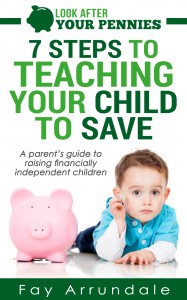5 Ways to Raise Financially Savvy Children
By Fay Arrundale from Look After Your Pennies 
Is your child a Saver or a Craver? Understanding their personality type will help you to teach them to be financially savvy. Research by The Money Advice Service found that our financial habits are set by the time we reach the age of 7 years old, and children learn most from observing their parents. Scary thought? So what as parents can we do to help our children learn good financial habits from a young age. Here’s my top 5 ways parents can support their children to become financially independent adults.
1) Involve them in everyday money matters
Children will only learn the value of things if they are exposed to a wide variety of what we buy, from a trip to the supermarket to buying birthday presents, help them make choices on what to buy. With the increase of using payment cards and online shopping, our children have never been further away from real cash - they think holes in walls give us money with no idea of how it got there or that it isn’t (unfortunately) available in unlimited supply.
You can also teach them the how to make their money go further by using vouchers and discounts. You can find these on many sites such as Vouchersort which offer a host of discounts when buying for your kids. Use these when buying furniture and toys from places like GLTC and teach your children an invaluable lesson in monetary value.
2) Get a fun money box
Find a box, old jam jar or money box that they love, decorate it and start putting money in. Small coins are fine, 5p, 10p or 20p, it doesn’t have to be large values, it’s the idea that they save. Then once they’ve saved a fiver, take them out to choose something to spend it on. You might be surprised that spending their own money takes far more decision making than spending yours!
3) Recognise your child’s money personality
I have a theory that we are born with a money personality type, which means we have a natural tendency to be either a Saver or a Craver. Savers are likely to be reserved, cautious in decision-making, part of the crowd. They might wait to see other people trying new things before taking the leap themselves. Savers gain pleasure from security and after much contemplation over whether to buy something, a Saver will get a lot of pleasure from that single purchase. Cravers are always looking for immediate pleasure; they tend to be risk takers. They are curious and determined and get pleasure from exploring new things. However, once a Craver has exhausted their new purchase, they quickly move on to something new and shiny. Which most closely matches your child’s personality? Now work with that personality. Children who are naturally Cravers might be more impulsive - help them by asking questions about what they are buying and encouraging them to reflect on their purchase. Savers are likely to be overwhelmed if they have too many options, help them by filtering out information and to focus on what is important to them, making decisions on what to buy easier for them.
4) Understanding value exchange
Children learn from a very young age the idea that we exchange things: we exchange something we have for something we want. This is the basics of money. Encourage them to swap a toy with a friend, set them small chores such as clearing away their dinner plate or making their bed in exchange for half an hour TV – you are introducing the idea that you can exchange something you do for something you want – they don’t need to include money.
5) Learning patience and compromise!
Learning they can’t have everything they want when they want it is part of growing up. As painful as that toddler tantrum is, by letting them go through the process of not getting what they want every time, they will learn to be patient and this will really help them in later years when saving for their first car or holiday. Give them choices when out shopping to have a magazine or sweets but not both. Learning to prioritise what we spend our money on is an important skill, and yes it is a skill that many adults haven’t quite grasped. As parents, you play a really important role in the relationship your children have with money. Don’t be put off from talking to your children about money if you’re not that confident yourself - let them learn from your mistakes. Financial independence is one of the best lessons you can teach your child.
 Fay Arrundale worked in Banking for 17 years, has a Business Management degree, and a Masters in Business Administration. She lives in Warwickshire with her husband and two young sons. Fay’s first book ‘7 Steps to teaching your child to save: A parents guide to raising financially independent children’ is available from Amazon in both paperback and Kindle format, only 99p on Kindle.
Fay Arrundale worked in Banking for 17 years, has a Business Management degree, and a Masters in Business Administration. She lives in Warwickshire with her husband and two young sons. Fay’s first book ‘7 Steps to teaching your child to save: A parents guide to raising financially independent children’ is available from Amazon in both paperback and Kindle format, only 99p on Kindle.
For more information visit www.lookafteryourpennies.com, Fay runs workshops for schools and parents based on building the skills to be financially independent. Fay can be contacted at fay@lookafteryourpennies.com
